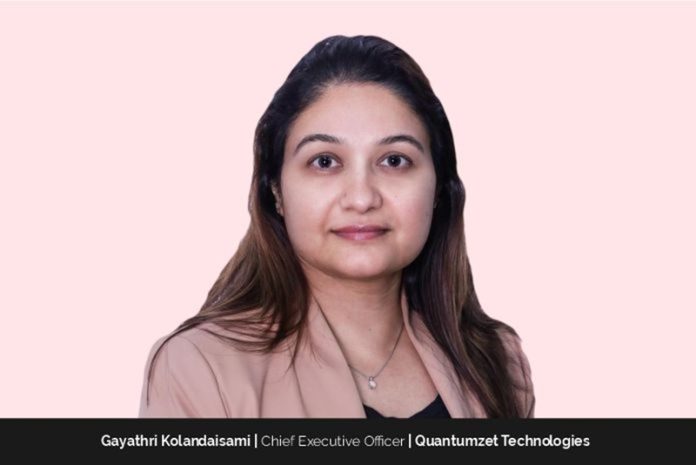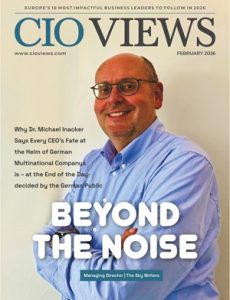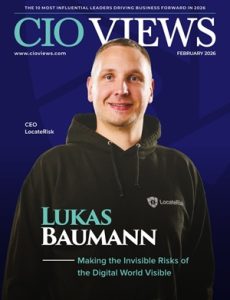The journey didn’t start in a policy table or a pitch deck. It began under a night sky in India, where a young girl with wide eyes and boundless questions sat beside her father, tracing constellations and asking how the universe worked. As other children memorized textbooks, Gayathri Kolandaisami was already unraveling systems. By Grade 11, while her father quietly hoped she’d pursue medicine, Gayathri had fallen in love with logic. An A+ in computer science sealed her direction. Losing her father during her master’s program was a seismic moment, but it didn’t knock her off course, rather it hardened her resolve. Her father’s belief in her, combined with the quiet grit of her mother and brother, motivated her to graduate at the top of her class with a gold medal.
At 25, she took her biggest leap yet, leaving India for South Africa. It was the beginning of her real education: on resilience, entrepreneurship, and the infrastructural fault lines no one wanted to talk about.
Quantumzet Technologies was founded by Logan Reddy, a veteran in South Africa’s municipal sector. However, when Gayathri joined, she brought something rare: a research-driven approach and a refusal to accept the status quo. While others rushed to solve electricity problems, she zeroed in on what matters most – water. That conviction led to CitiOS in 2013 – a patented smart city platform designed to digitize and humanize water infrastructure. “Quantumzet became our shared vision,” Gayathri mentions, “combining our chairman’s municipal expertise with my research-driven insights to develop solutions that help governments build truly sustainable and inclusive cities.”
She later pursued an MBA, earning a distinction in 2020 for her dissertation on smart cities in developing countries. Her real learning has always come from the field – from listening to municipalities, walking through broken systems, and asking better questions.
Redefining Influence in the Digital Age
In her world, influence is about what happens when people pour their hearts into a shared mission – not because they’re told to, but because they want to. “It is the difference between compliance and commitment, between executing tasks and driving transformation,” Gayathri explains. As CEO of Quantumzet Technologies, she defines influence by the ripple effect of how deeply her work reshapes lives and whether it builds a more sustainable world. Every decision is measured against a single question: “Will this improve the quality of life for communities and leave a more sustainable world for our future generations?”
In the specialized space where municipal services and digital transformation intersect, Gayathri’s leadership combines technical precision with deep cultural empathy. She immerses herself in the local context, understanding a municipality’s pain points, political dynamics, and budgetary constraints before recommending a single line of code. From social media to global panels, she uses digital platforms not to build a personal brand but to elevate ideas and spark conversations around inclusive innovation and people-first urban development.
In the municipalities Quantumzet serves, her insights reimagine how cities serve people. It’s like turning legacy systems into living, adaptive platforms that inspire others to rethink what’s possible. In Gayathri’s guidebook, influence is measured by the number of lives improved through water delivery, services restored, and futures made brighter.
The Pivotal Decision That Repositioned Quantumzet
It began with a single, disruptive question: “Why limit our impact to the government when the private sector holds so much potential for scalable, meaningful transformation?”
That moment reframed her vision for Quantumzet. As CEO, she made a decisive call to expand the company’s focus beyond government. Sustainability, she realized, demands shared responsibility. While municipalities remained central, industry players were stepping up with bold ideas and urgency.
Quantumzet is now building solutions that serve both utility and enterprise, tools that bridge policy with innovation and public service with private ingenuity. This new direction is setting the stage for a future where environmental stewardship, smart infrastructure, and human well-being form a unified mandate.
Let the Best Ideas Win: Building a Culture of Innovation and Accountability
Step inside Quantumzet and the first thing you’ll notice isn’t the tech. It’s the atmosphere involving the space to speak up, shape, and challenge. Gayathri has worked deliberately to make that possible. From junior engineers to senior leads, every suggestion is met with curiosity. That openness is now integral to the company’s culture, encouraging bold exploration without losing sight of its mission.
When the team began exploring AI, Gayathri invited conversation. What emerged wasn’t just consensus but a shared architecture created by those closest to the work. “When someone proposes a new approach or technology,” Gayathri demonstrates, “they don’t just follow through because it is assigned to them. They do it because they believe in it.” Accountability shows up on its own. Pride, precision, follow-through – these grow when people care deeply about what they’ve created.
Scaling with Intention to Tackle the Toughest Growth Hurdles
According to the CEO, Quantumzet’s growth was unconventional: no turf wars, no frantic recruitment drives. The team mapped out a lean model built for precision: a tight, permanent group supported by rotating specialists – people who think differently and adapt quickly.
Gayathri says this structure gave the company speed and agility. But it also meant facing one of the toughest obstacles in space: public procurement. Government systems are slow to move and even slower to trust. For a young company pushing bold ideas, that made the path steeper.
Rather than try to outshout bigger players, her team stayed close to the ground, showing up, solving problems, and earning trust over time. That consistency translated into momentum. In her view, their version of the scale is measured in municipal buy-in, project success, and the quiet credibility that comes from being in work, not just pitching it.
Staying Sharp in a Fast-Moving Field
Ranked among “The 10 Most Influential Business Leaders to Watch in 2025,” Gayathri’s approach to staying ahead of emerging technologies is multi-layered. “I dedicate time each day to micro-learning, i.e., reading technical papers, industry insights, engaging in expert forums, and experimenting hands-on with emerging tools,” she says. This daily discipline ensures that Quantumzet’s strategy remains both responsive and relevant.
But staying ahead isn’t a solo sport. Gayathri places deep value on dialogue with peers, partners, and thinkers across industries. “Innovation thrives in shared curiosity and open collaboration,” Gayathri adds. At Quantumzet, experimentation is structured through targeted pilots that test how new technologies can be applied without overcommitting resources. Many signals come directly from the field – from service delivery challenges to inefficiencies in water infrastructure.
When AI began reshaping the global tech conversation, Gayathri and her team were ready. Their early groundwork allowed them to explore practical applications with confidence and speed.
“In this way, we aim to be early adopters of what truly matters,” Gayathri remarks, “while avoiding the noise of every passing trend.”
Embedding Diversity and Inclusion into Every Layer of the Work
Gayathri leads with a grounded belief that innovation carries real value only when it mirrors the people it aims to serve. She often reflects on how transformative diverse teams have been – not just in philosophy but in the quality and relevance of outcomes they produce.
At Quantumzet, diversity is a foundational design principle. The team comprises individuals from diverse disciplines, cultural backgrounds, and lived experiences. This multiplicity drives sharper insight and more resonant solutions. When designing technology for communities, from rural regions managing water access to intricate urban infrastructure, Gayathri emphasizes the importance of reflecting that complexity within the team. A workforce that mirrors its users becomes a strategic edge.
She also ensures that inclusion extends beyond the company. Municipal officials, field workers, and citizens are involved early through collaborative feedback. Their input actively shapes product development, making solutions more grounded, relevant, and widely adopted.
Balancing Urgency with Vision
When a water system failure threatens thousands, response time matters. Gayathri knows that short-term action is a responsibility, not a choice. However, even in moments of urgency, her leadership allows for long-term thinking.
She views the balance between performance and sustainability as situational, requiring sound judgment. A critical infrastructure issue may demand immediate resolution while also setting the stage for broader improvements. Gayathri underlines, “That said, our core philosophy ensures we never trade long-term impact for short-term convenience.”
Every immediate solution is built with a second layer in mind about how it contributes to transformation over time. Whether improving infrastructure or deploying digital tools, short-term steps are designed to catalyze lasting change.
A Defining Breakthrough at Quantumzet
For Quantumzet, that moment came with technical validation and co-sell approval from Microsoft. More than a partnership, it marked a breakthrough – proof that the company’s municipal tech could meet global standards without losing its purpose-driven soul.
CEO Gayathri led from the front, immersing herself in the technical process, steering the platform toward Microsoft’s benchmarks, and aligning the long-term vision. Just as vital was the soft power she brought: building trust, not just ticking boxes.
The validation amplified Quantumzet’s credibility and opened doors once out of reach. It positioned the company as a reliable, forward-looking partner. “When purpose-driven leadership is combined with technical excellence,” she sums up, “a niche company can confidently step onto the global stage.”
Grounded by Purpose, Driven by Responsibility
In a role where pressure never lets up, Gayathri remains grounded by two principles: stay humble and keep moving. “The moment you think you have all the answers is when you stop learning,” she says. For her, that mindset is non-negotiable. What keeps her steady is the human impact behind the work. She doesn’t see data points or dashboards; she sees families, communities, and citizens whose daily experiences can be transformed by a well-executed solution.
That mindset turns pressure into purpose. When municipalities choose Quantumzet, they’re entrusting a team to get it right. For Gayathri, that trust is the engine. It sharpens her clarity, fuels her commitment, and reminds her exactly why she’s in this work.
Quantumzet’s Unique Edge
In a crowded tech ecosystem, Quantumzet competes on depth, not scale. What sets the company apart isn’t just its niche products or personalized solutions; it’s the conviction behind them. Each project reflects the leadership team’s direct expertise and personal investment. There’s no assembly-line thinking here.
The team understands the municipal system’s layered bureaucracy, tight budgets, and high-stakes infrastructure demands. That insider perspective shapes every design decision. Quantumzet’s lean consultant model adds agility. Instead of bloated teams, they bring in top-tier experts’ laser-focused on client challenges. But what defines the firm is its long-view mindset. Clients are seen as partners in progress. Each engagement presents an opportunity to deliver ongoing support, insights, and strategic guidance as their needs evolve.
Building a Lasting Legacy
“Transforming Communities with Smart Technologies for a Sustainable Tomorrow. Empowering People! Elevating Lives.” This corporate slogan is Gayathri’s North Star. For her, legacy isn’t about revenue or market share. It’s about creating results that endure in communities across South Africa and beyond.
Through Quantumzet, she’s working to ensure every citizen – regardless of location or income – has access to clean water, responsive municipal services, and the benefits of smart infrastructure. Her goal goes beyond digital efficiency; it’s about digital equity – bridging the tech gap in underserved areas with platforms that serve the public good as powerfully as they serve performance.
She envisions a future where South Africa rises as a global leader in sustainable urban development, with smart cities that are resilient, inclusive, and environmentally conscious. The platforms they’re building today are designed for generations to come. Lastly, Gayathri wants Quantumzet to serve as proof that, with the right vision, partnerships, and commitment to the community, a small South African tech company can drive real change. She concludes with resolve, “That is a legacy worth building – one where technology becomes a bridge to a more sustainable and equitable future for all.”
Advice For Founders Who Start with Fire, Not Hype
To those hoping to make their mark in tech, Gayathri urges a mindset shift that begins by ignoring investor slides and market trends. “Don’t build what you think the market wants,” she says. “Build what you believe the world truly needs.” For her, the true engine of entrepreneurship is purpose. Market signals may tempt with quick wins, but they rarely sustain. What endures is a passion rooted in authenticity and a deep understanding of the problem you’re solving.
But idealism alone doesn’t build companies. Strategy grounds it. Gayathri underscores the importance of knowing your ecosystem, staying close to the problem, and building for durable, meaningful outcomes. “Don’t fall in love with technology,” she forewarns. “Fall in love with the effect it can create.” She encourages founders to listen more than they speak, to learn relentlessly, and to begin humbly. And for those still finding their place in the tech world, Gayathri offers a rallying cry: “Embrace being an outsider.” Real innovation often starts at the margins – with overlooked problems and unorthodox paths.
The road will test your patience, stretch your limits, and demand conviction more than charisma. But those who stay grounded in real human needs – who build with humility, persistence, and vision – are the ones who make a lasting difference. Because, in Gayathri’s world, “the legacy you create will far outlast any temporary success.”





